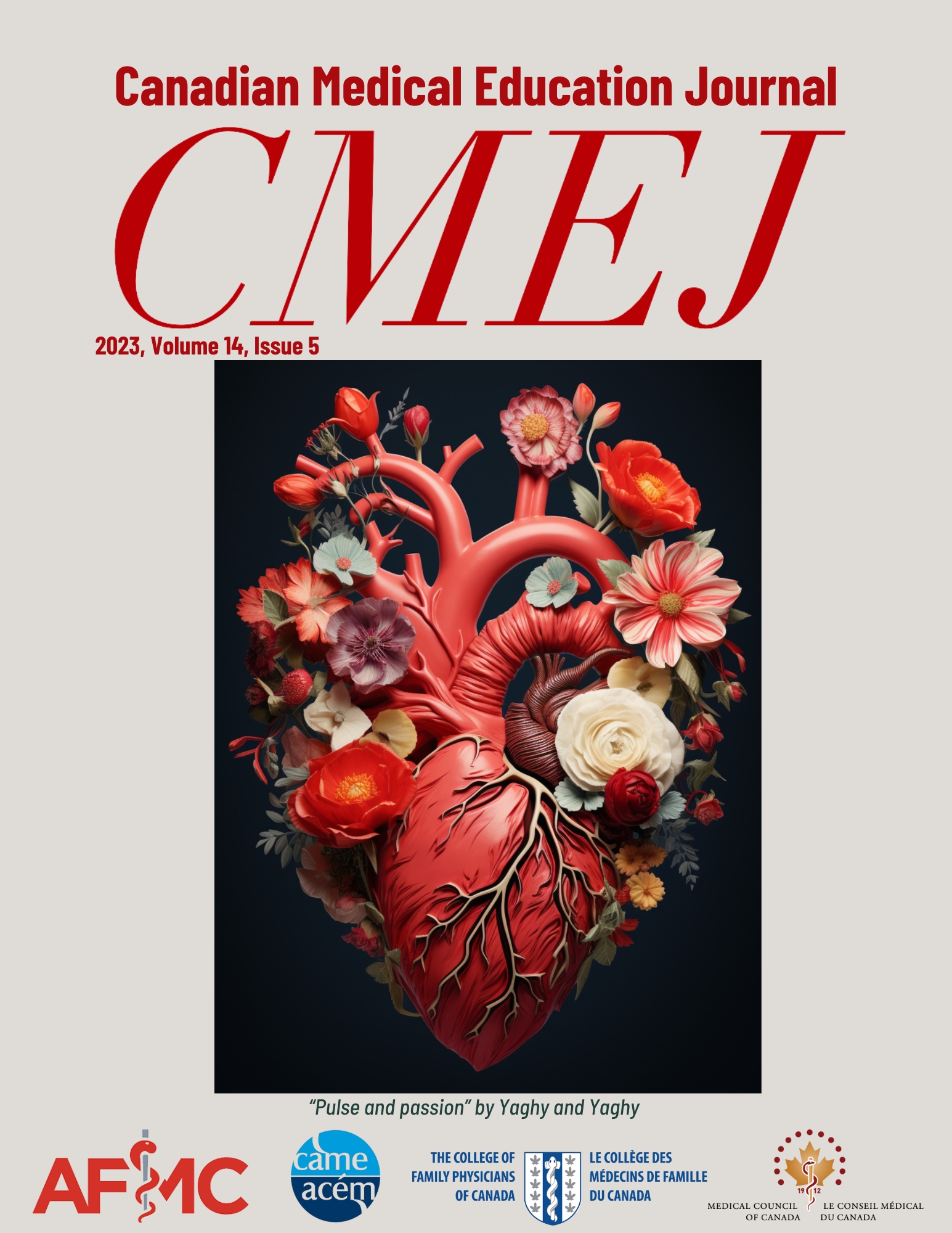A brief report of aspiring medical student perceptions and behaviours concerning research experiences for selection into Canadian medical schools
DOI:
https://doi.org/10.36834/cmej.76255Abstract
Background: Aspiring medical students behave based on their perception of what is valued in the selection process. While research experience is not explicitly considered in most Canadian admissions policies, it is commonly held as valuable within aspiring medical student communities. The purpose of this study is to describe the perceptions and behaviours of aspiring medical students with respect to gaining research experience in support of their medical school applications.
Methods: We surveyed prospective applicants of Canadian medical schools between August 2021 and November 2021, then compiled descriptive statistics pertaining to their perceptions and behaviours.
Results: Respondents affirmed the belief that research experience is valued in medical school admissions processes. They reported spending approximately 13 hours per week engaged in research, which usually did not yield publication or presentation recognition.
Conclusion: Aspiring medical students invest substantial time and energy in research experiences to benefit their applications. There is room for medical schools to be more transparent about the value of research experience in their admissions processes.
References
AFMC. Admission requirements of Canadian Faculties of Medicine for admission in 2023. Ottawa, ON.
Yang L, Chang I, Ritz S, et al. Research experiences for Canadian aspiring physicians: a descriptive analysis of medical school admission policies concerning research involvement in Canada. BMC Med Educ 2022; 22: https://doi.org/1–10.10.1186/s12909-022-03207-y. DOI: https://doi.org/10.1186/s12909-022-03207-y
MedApplications. 5 tips to find a research position as a pre-med college student. 2020. Available at https://medapplications.com/5-tips-find-research-position-pre-med-college-student/ [Accessed on Apr 25, 2021].
Kowarski I. What type of research impresses med schools? US News & World Report. 2019. www.usnews.com/education/best-graduate-schools/top-medical-schools/articles/2019-05-30/what-type-of-research-helps-you-get-into-medical-school [Accessed on Apr 25, 2021].
Princeton Review. 6 ways for pre-meds to gain research experience. 2021. Available at https://www.princetonreview.com/med-school-advice/research-experience-for-medical-school [Accessed on Apr 25, 2021].
Lin KY, Anspach RR, Crawford B, et al. What must I do to succeed?: Narratives from the US premedical experience. Soc Sci Med. 2014; 119: 98–105. https://doi.org/10.1016/j.socscimed.2014.08.017. DOI: https://doi.org/10.1016/j.socscimed.2014.08.017
White J, Brownell K, Lemay J-F, et al. ‘What do they want me to say?’ the hidden curriculum at work in the medical school selection process: a qualitative study. BMC Med Educ 2012; 12: 1–9.10.1186/1472-6920-12-17. https://doi.org/10.1186/1472-6920-12-17 DOI: https://doi.org/10.1186/1472-6920-12-17
Razack S, Lessard D, Hodges BD, Maguire MH, Steinert Y. The more it changes; the more it remains the same: a Foucauldian analysis of Canadian policy documents relevant to student selection for medical school. Adv Health Sci Educ. 2014;19:161–81. https://doi.org/10.1007/s10459-013-9468-2 DOI: https://doi.org/10.1007/s10459-013-9468-2
Hafferty FW. Beyond curriculum reform: confronting medicine’s hidden curriculum. Acad Med. 1998;73:403–7. https://doi.org/10.1097/00001888-199804000-00013 DOI: https://doi.org/10.1097/00001888-199804000-00013
Tummers L. Public policy and behavior change. Public Admin Rev 2019; 79: 925–930. https://doi.org/10.1111/puar.13109. DOI: https://doi.org/10.1111/puar.13109
Artino AR, La Rochelle JS, Dezee KJ, Gehlbach H. Developing questionnaires for educational research: AMEE Guide No. 87. Med Teach. 2014;36(6), 463–474. http://doi.org/10.3109/0142159X.2014.889814. DOI: https://doi.org/10.3109/0142159X.2014.889814
Government of Canada SC. Classification of gender. 2021. https://www23.statcan.gc.ca/imdb/p3VD.pl?Function=getVD&TVD=1326727 [Accessed on Apr 19, 2022].
AFMC. Canadian Medical Education Statistics 2020. Ottawa, ON.
Beran T. Research Advances in Conformity to Peer Pressure: A Negative Side Effect of Medical Education. Health Profess Educ. 2015; 1: 19–23. https://doi.org/10.1016/j.hpe.2015.11.004. DOI: https://doi.org/10.1016/j.hpe.2015.11.004
De Freitas C, Buckley R, Klimo R, et al. Admissions experiences of aspiring physicians from low-income backgrounds. Med Ed. 2021; 55: 840–849. https://doi.org/10.1111/medu.14462. DOI: https://doi.org/10.1111/medu.14462
Michalec B, Hafferty FW. Examining the U.S. premed path as an example of discriminatory design & exploring the role(s) of capital. Soc Theory Health 2022; 1–28. https://doi.org/10.1057/s41285-022-00175-7. DOI: https://doi.org/10.1057/s41285-022-00175-7
Grace MK. Subjective social status and premedical students’ attitudes towards medical school. Soc Sci Med 2017; 184: 84–98. https://doi.org/10.1016/j.socscimed.2017.05.004. DOI: https://doi.org/10.1016/j.socscimed.2017.05.004
Downloads
Published
Issue
Section
License
Copyright (c) 2023 Irene Chang, Laurie Yang, Asiana Elma, Stacey A Ritz, Lawrence Grierson

This work is licensed under a Creative Commons Attribution-NonCommercial-NoDerivatives 4.0 International License.
Submission of an original manuscript to the Canadian Medical Education Journal will be taken to mean that it represents original work not previously published, that it is not being considered elsewhere for publication. If accepted for publication, it will be published online and it will not be published elsewhere in the same form, for commercial purposes, in any language, without the consent of the publisher.
Authors who publish in the Canadian Medical Education Journal agree to release their articles under the Creative Commons Attribution-Noncommercial-No Derivative Works 4.0 Canada Licence. This licence allows anyone to copy and distribute the article for non-commercial purposes provided that appropriate attribution is given. For details of the rights an author grants users of their work, please see the licence summary and the full licence.











